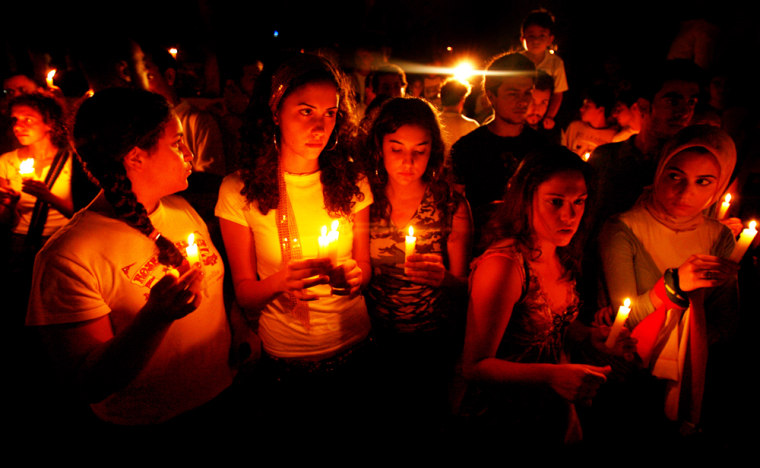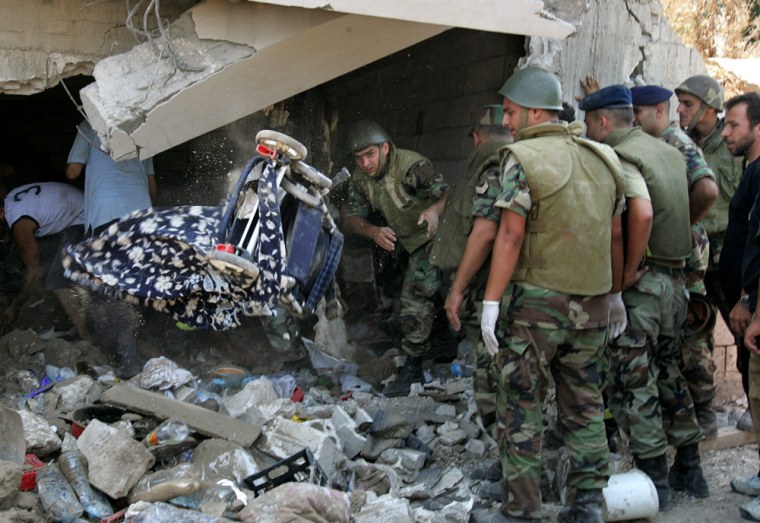Abu Shadi Jradi pulled bodies out of wreckage for hours — two toddler girls wearing tiny gold earrings, a small boy whose pale blue pacifier still hung from his neck. Somewhere in the middle, Jradi slumped beneath a tree and wept.
“There are so many children, so many children,” the veteran civil defense worker said Sunday, barely able to get out the words.
The dead still had signs of their last moments, when dozens of members of the Shalhoub and Hashem families had gathered together for shelter and company during another night of Israeli bombardment. Kids wore the shorts and T-shirts they slept in. One body was wrapped in a child’s bed sheet covered with Raggedy Ann and Andy figures.
Their three-story house on the outskirts of the village of Qana was leveled when a missile crashed into it at 1 a.m. Red Cross officials said 56 were killed. Police said 34 children and 12 adult women were among them — the worst single strike since Israel’s campaign in Lebanon began on July 12.
Israel apologized for the strike, but blamed Hezbollah, saying its guerrillas had fired rockets from nearby the house. It said it had warned residents of the village to leave.
But many in Qana — like the thousands believed holed up across south Lebanon — said they were too afraid to leave on roads that have been heavily bombarded by Israeli forces. The main road to the nearest city, Tyre, is lined with cars smashed by missiles and pancaked buildings.
Qana was a target before
Lebanese quickly branded the strike “Qana’s second massacre.” In April 1996, Israeli shells hit a U.N. peacekeepers’ compound where 800 Lebanese had taken refuge during another offensive against Hezbollah, called Operation Grapes of Wrath. The shelling killed 106 refugees. Israel said at the time Hezbollah fighters had slipped into the U.N. compound.
On Sunday, rescue workers dripped with sweat in the blistering heat as they pored through the wreckage, tossing out a baby carriage and moving hunks of concrete and brick.
Thirteen-year-old Noor Hashem was one of only eight survivors found by the afternoon. She was pulled out by her uncle, Mohammed Ali Shalhoub, whose wife, five children and mother all died. Hashem’s four brothers and sisters were also killed. Her mother survived but she didn’t know about her father.
Hashem said she woke up screaming when the rocket hit.
Survivor's tale
“I was so afraid. There was dirt and rocks and I couldn’t see. Everything was black. I couldn’t see anyone. I tried to push the rocks and everything off of me and then someone pulled me out,” she said.
Khalil Shalhoub who had been clearing rubble lunged at a stretcher when he saw who was on it: his brother. The workers carrying it stumbled as he screamed.
Khalil had been in a nearby house when the missile hit. “It came in right at the door. I saw it. It was aimed right for the door,” he said. He said planes were still firing afterward, preventing him and others from rushing to the wreckage in the night.

“In this village, there are so few places to hide that we just go into one or two houses and sit together. It is like a shelter,” he said.
Jradi said he got the call to rush to Qana from Tyre. But he couldn’t go immediately, with Israeli warplanes still overhead. “It was too dangerous,” he said. Through the morning, workers dug with their hands before heavy machinery arrived in the afternoon to search for bodies deeper within the wreckage.
The dead were carried out in blankets, sheets and carpets. The eldest was a 95-year-old man, a Shalhoub — the youngest a 9-month-old child of the Hashems.
The arm of a child slipped from beneath the dirty gray blanket that covered him. On the same stretcher, toes painted with bright red polish peeked out. A rescue worker lifted the blanket to show two shattered children who were curled up looking asleep except for the thick dried blood at their noses.
Support for Hezbollah builds
Like in many villages of the south, support for Hezbollah guerrillas is strong in Qana, nine miles from the Israeli border.
Hezbollah flags were placed on some of the bombed out buildings. From his hospital bed in Tyre, Mohammed Ali Shalhoub said that from their graves, his wife and children “were all saying God bless Sheik Hassan Nasrallah,” the Hezbollah leader.
In Qana, resident Mohammed Ismail waved at seven dead lined up on the ground, saying President Bush “laughs when they ask him about the dead bodies.”
One elderly man from the Shalhoub family walked shakily for several steps, then collapsed crying in the arms of an ambulance worker.
“Why? I don’t know why. I love my God, my family, nothing else, and for that I should be killed?”
